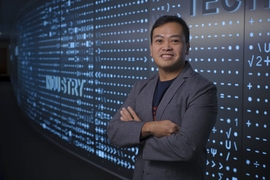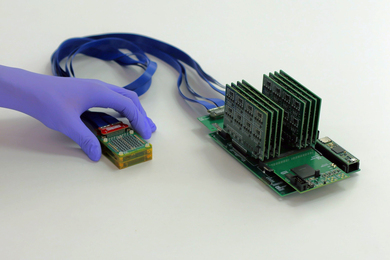A traditional hackathon focuses on computer science and programming, attracts coders in droves, and spans an entire weekend with three stages: problem definition, solution development, and business formation.
Hacking Nanomedicine, however, recently brought together graduate and postgraduate students for a single morning of hands-on problem solving and innovation in health care while offering networking opportunities across departments and research interests. Moreover, the July hackathon was the first in a series of three half-day events structured to allow ideas to develop over time.
This deliberately deconstructed, yearlong process promotes necessary ebb and flow as teams shift in scope and recruit new members throughout each stage. “We believe this format is a powerful combination of intense, collaborative, multidisciplinary interactions, separated by restful research periods for reflecting on new ideas, allowing additional background research to take place and enabling additional people to be pulled into the fray as ideas take shape,” says Brian Anthony, associate director of MIT.nano and principal research scientist in MIT’s Institute for Medical Engineering and Science (IMES) and Department of Mechanical Engineering.
Organized by Marble Center for Cancer Nanomedicine Assistant Director Tarek Fadel, Foundation Medicine’s Michael Woonton, and MIT Hacking Medicine Co-Directors Freddy Nguyen and Kriti Subramanyam, the event was sponsored by IMES, the Koch Institute’s Marble Center for Cancer Nanomedicine, and MIT.nano, the new 200,000-square-foot nanoscale research center that launched at MIT last fall.
Sangeeta Bhatia, director of the Marble Center, emphasizes the importance of creating these communication channels between community members working in tangentially-related research spheres. "The goal of the event is to galvanize the nanotechnology community around Boston — including MIT.nano, the Marble Center, and IMES — to leverage the unique opportunities presented by miniaturization and to answer critical questions impacting health care,” says Bhatia, who is also the John J. and Dorothy Wilson Professor of Health Sciences and Technology at MIT.
At the kickoff session, organizers sought to create a smaller, workshop-based event that would introduce students, medical residents, and trainees to the world of hacking and disruptive problem solving. Representatives from MIT Hacking Medicine started the day with a brief overview and case study on PillPack, a successful internet pharmacy startup created from a previous hackathon event.
Participants then each had 30 seconds to develop and pitch problems highlighting critical health care industry shortcomings before forming into five teams based on shared interests. Groups pinpointed a wide array of timely topics, from the nation’s fight against obesity to minimizing vaccine pain. Each cohort had two hours to work through multifaceted, nanotechnology-based solutions.
Mentors Cicely Fadel, a clinical researcher at the Wyss Institute for Biologically Inspired Engineering and neonatologist at Beth Israel Deaconess Medical Center, and David Chou, a hematopathologist at Massachusetts General Hospital and clinical fellow at the Wyss Institute, roamed the room during the solution phase, offering feedback on feasibility based on their own clinical experience.
At the conclusion of the problem-solving block, each of the five teams presented their solution to a panel of expert judges: Imran Babar, chief business officer of Cydan; Adama Marie Sesay, senior staff engineer of the Wyss Institute; Craig Mak, director of strategy at Arbor Bio; Jaideep Dudani, associate director of Relay Therapeutics; and Zen Chu, senior lecturer at the MIT Sloan School of Management and faculty director of MIT Hacking Medicine.
Given the introductory nature of the event, judges opted to forego the traditional scoring rubric and instead paired with each team to offer individualized, qualitative feedback. Event sponsors note that the decision to steer away from a black-and-white, ranked-placing system encourages participants to continue thinking about the pain points of their problem in anticipation of the next hackathon in the series this fall.
During this second phase, participants will further develop their solution and explore the issue’s competitive landscape. Organizers plan to bring together local business and management stakeholders for a final event in the spring that will allow participants to pitch their project for acquisition or initial seed funding.
Founded in 2011, MIT Hacking Medicine consists of both students and community members and aims to promote medical innovation to benefit the health care community. The group recognizes that technological advancement is often born out of collaboration rather than isolation. Monday’s event accordingly encouraged networking among students and postdocs not just from MIT but institutions all around Boston, creating lasting relationships rooted in a commitment to deliver crucial health care solutions.
Indeed, these events have proven successful in fostering connections and propelling innovation. According to MIT Hacking Medicine’s website, more than 50 companies with over $240 million in venture funding have been created since June 2018 thanks to their hackathons, workshops, and networking gatherings. The organization’s events across the globe have engaged nearly 22,000 hackers eager to disrupt the status quo and think critically about health systems in place.
This past weekend, MIT Hacking Medicine hosted its flagship Grand Hack event in Washington. Over the course of a weekend, like-minded students and professionals across a range of industries will join forces to tackle issues related to health care access, mental health and professional burnout, rare diseases, and more. Sponsors hope that Monday’s shorter, intimate event will garner enthusiasm for larger hackathons like this one to sustain communication among a diverse community of experts in their respective fields.








